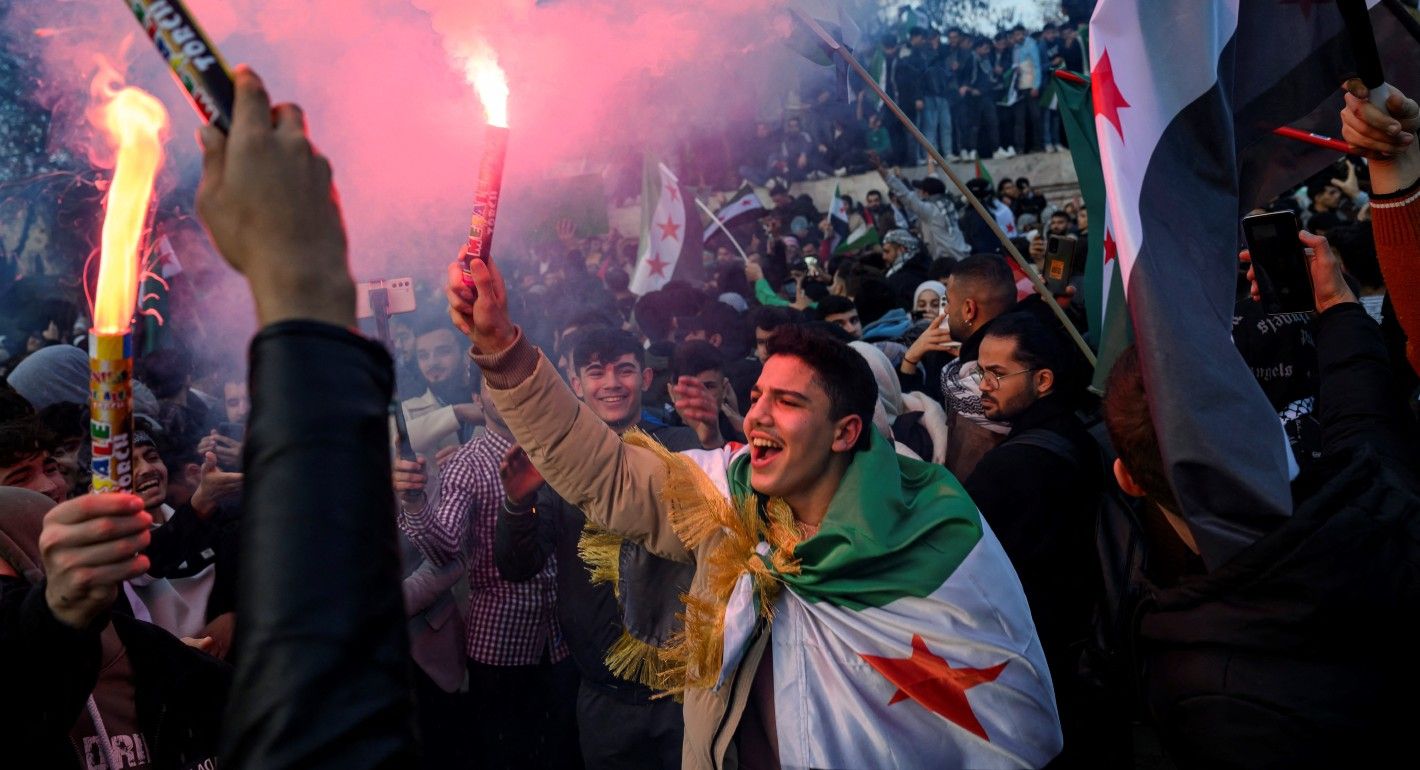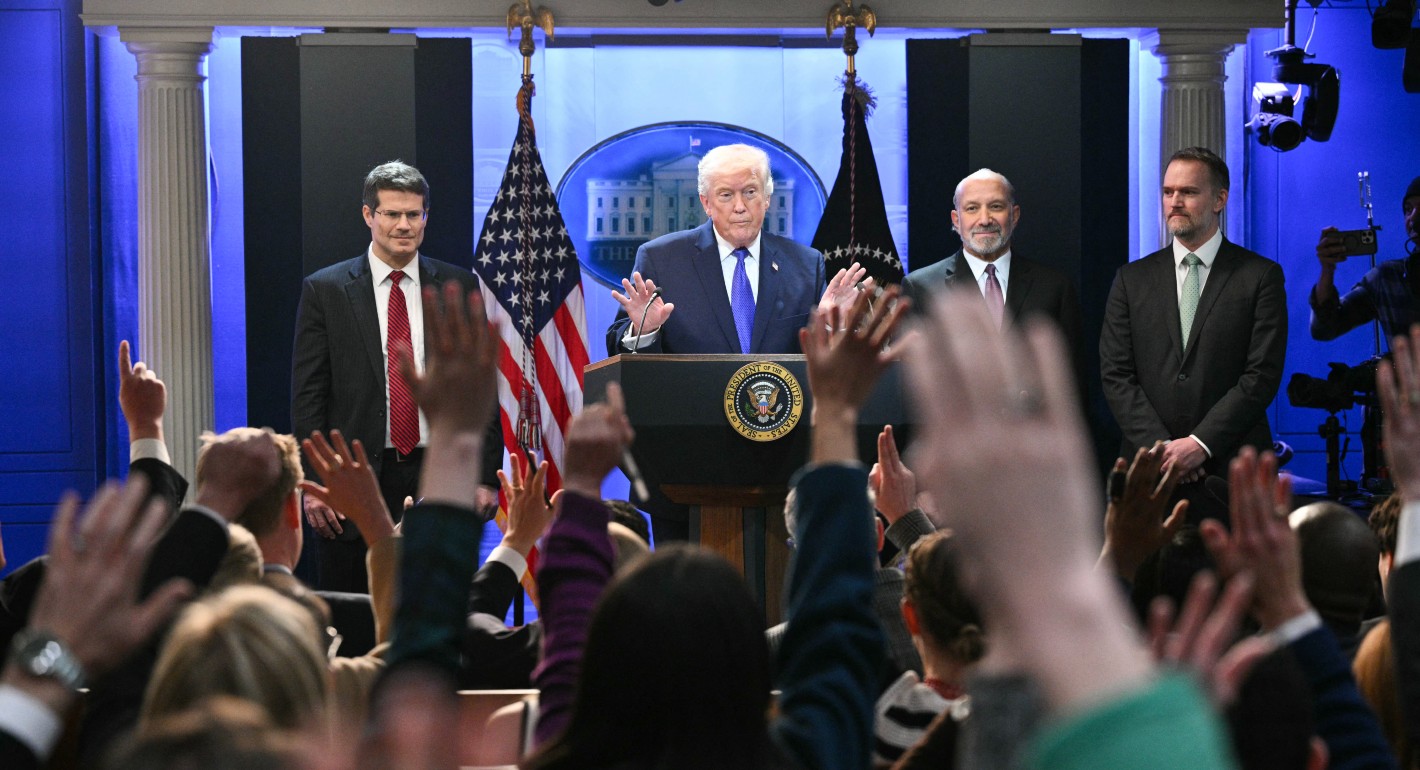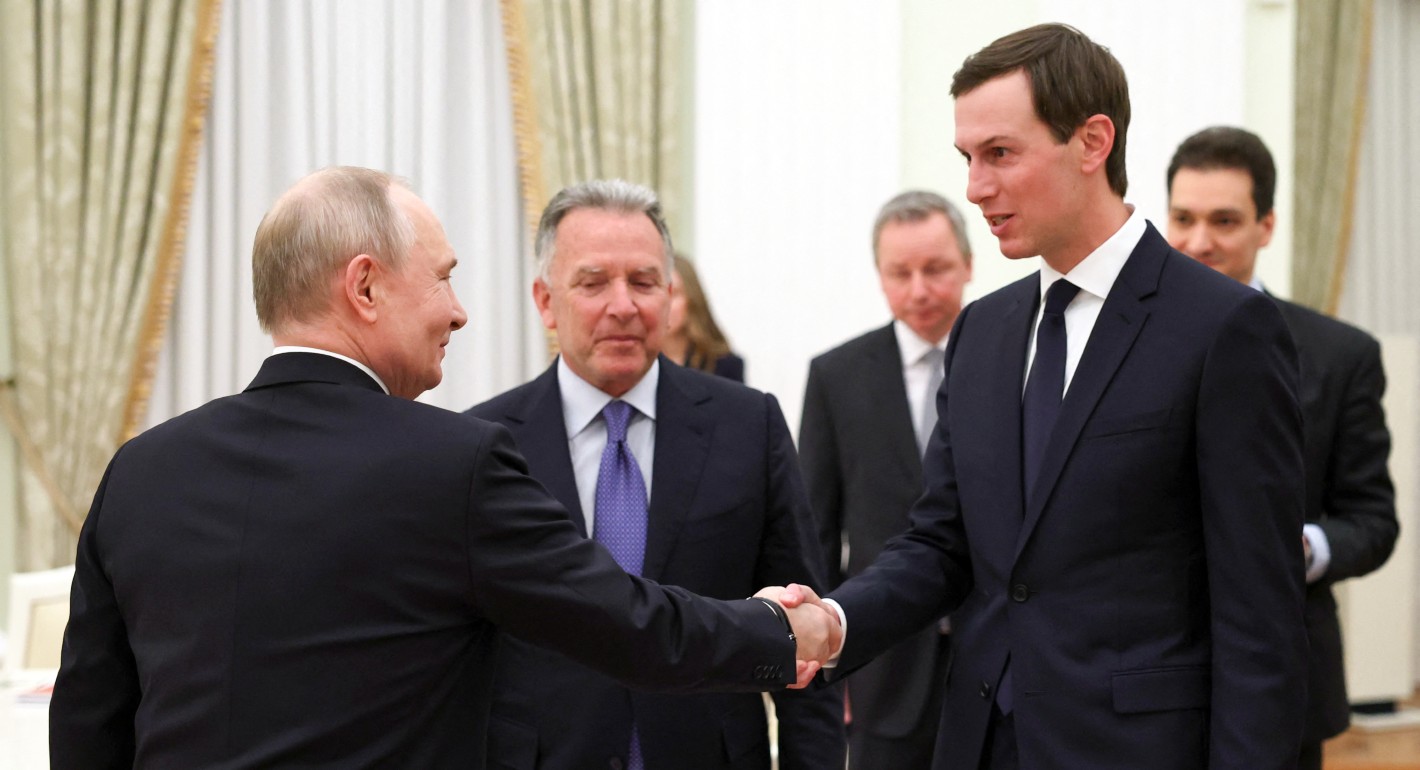Alper Coşkun
{
"authors": [
"Alper Coşkun"
],
"type": "commentary",
"blog": "Emissary",
"centerAffiliationAll": "dc",
"centers": [
"Carnegie Endowment for International Peace"
],
"collections": [
"Türkiye and the World",
"European Politics"
],
"englishNewsletterAll": "",
"nonEnglishNewsletterAll": "",
"primaryCenter": "Carnegie Endowment for International Peace",
"programAffiliation": "EP",
"programs": [
"Europe"
],
"projects": [],
"regions": [
"Türkiye",
"Syria",
"Russia",
"Iran"
],
"topics": [
"Security",
"Foreign Policy"
]
}
People celebrate the fall of Assad in Istanbul on December 8. (Photo by Yasin Akgul/AFP via Getty Images)
Türkiye Has a Wish List in Syria. It Should Tread Lightly.
Assad’s fall has changed the region’s power equilibrium, and Türkiye is eager to capitalize. But it should be aware of the pitfalls.
Türkiye is basking in triumph after the collapse of Bashar al-Assad’s regime—and trying to cash in on the moment. The head of Turkish intelligence, Ibrahim Kalın, wasted no time in visiting Damascus, where he was accompanied by Abu Mohammed al-Golani, leader of Hayat Tahrir al-Sham (HTS), the rebel movement that toppled Assad. This was a trip Türkiye reportedly coordinated with its Western allies and used as an opportunity to convey shared expectations with the new Syrian leadership, representing a semblance of unity in action. Meanwhile, Türkiye’s diplomatic representation in Syria, which had been absent since 2012, quickly resumed its operations—a sign of the fast pace at which the landscape in Damascus is evolving.
With Assad out of the picture, Russian and Iranian influence in decline, and overall dynamics in Syria shifting in its favor, Ankara is upbeat. It sees a historic opportunity to advance its geostrategic interests and gain an advantage over Iran for regional domination, and it is scrambling to position itself for that purpose. Before the latest events, Türkiye’s Syria wish list essentially had three main elements:
- Eradicating the cross-border threat posed by the U.S.-supported Syrian Democratic Forces (SDF), comprised mainly of the Kurdistan Workers Party (PKK) and its affiliates in Syria
- Creating the conditions for the return of more than 3 million registered Syrian refugees currently living in Türkiye
- Keeping the upper hand in its unspoken but ever-present rivalry with Iran and Russia
Ankara now sees a pathway to a trifecta—the potential to make progress on all three fronts, and maybe more.
Türkiye’s relations with Assad’s Syria have been nothing short of a roller-coaster ride. They’ve ranged from outright enmity in the late 1990s, to a thaw in relations and Ankara encouraging Assad to heed popular demand for reforms during the Arab Spring, to an overt attempt to overthrow him by using proxies. When all else failed, Ankara reverted to diplomatic overtures in a remarkable policy turnabout, calling for dialogue. Regardless, Assad muddled through, barely keeping his regime intact thanks in no small part to his patrons in Moscow and Tehran. He grew more confident in 2023 after the Arab world restored its ties with Syria, marking a reversal of the country’s diplomatic isolation since 2011. In contrast to Türkiye’s inability to change the status quo, things seemed to be going reasonably well for Assad—or so he thought, until he had to flee.
The lightning speed and ease with which the rebel onslaught unfolded was noteworthy. The leadership of HTS—a terrorist-designated group portraying a renewed, palatable image—described a yearlong preparation involving efforts to stitch together a web of disparate opposition groups and the development of joint operational capabilities, including gaining expertise on the use of drones. The degree of outside support that might have been involved and Türkiye’s potential role remains a question mark.
Many assume Ankara must have rendered support in the background or at least given its tacit approval, though Turkish officials deny any involvement. However, it would be naïve to assume that Ankara was totally unaware of what was to come, given its entanglement in Syrian affairs and extensive military and intelligence network on the ground. Though there is no patron-client relationship between Türkiye and HTS, the rebel group likely could not have consolidated its power and prepared for this move without Ankara noticing. Speaking to the press, U.S. President-Elect Donald Trump was unequivocal in his belief that Türkiye was behind Assad’s fall. Praising Türkiye’s military capabilities and his personal relationship with President Recep Tayyip Erdoğan, Trump said Türkiye held the key to Syria’s future, yet characterized its actions as an “unfriendly takeover,” puzzling listeners and presumably leaving Ankara wondering what lies in store for when he takes office.
One way or another, the tables have turned in Syria, and Türkiye is eager to capitalize on the moment to address some of its immediate national security concerns and bolster its regional influence.
The SDF is already feeling the heat. Syrian opposition forces aligned with Türkiye have successfully advanced on their positions, obliging the SDF to cede territory and retreat east of the Euphrates River—a long-standing Turkish demand. The weakened SDF is also making tactical concessions to the HTS leadership in Damascus. For example, it has raised the revolutionary flag in the territories it controls, as a sign of its submission to the central authorities, over whom Türkiye now holds greater sway. These are clear indications of the precarious situation the SDF finds itself in and that its days of regional autonomy may be numbered, especially as uncertainties loom over its U.S. support in the upcoming Trump era. Recent statements from American and European officials recognizing Türkiye’s legitimate security concerns from the threat of terrorism have been welcomed in Ankara.
Türkiye’s leadership also sees an opportunity to begin repatriating Syrian refugees, a highly politicized matter that catapulted the Turkish political opposition to victory in local elections earlier this year. Assad’s fall eliminates the biggest obstacle—the refugees’ fear of retribution—making it easier to encourage voluntary returns. As border crossings reopen for this purpose, pro-government media outlets are busy broadcasting images of Syrian refugees returning. An estimated 20,000 have returned to Syria, with many more expressing their intent to do so, irrespective of the immense investment and groundwork needed to create the conditions to sustain an orderly and voluntary return.
Over the years, Türkiye had been anxiously watching Iran increase its regional influence—first in Iraq, then in Syria, nurturing a Shia belt on Türkiye’s eastern frontier. In a similar fashion, Türkiye saw Russia plant its foot firmly in Syria and, combined with Moscow’s increasing presence in Libya and the African continent at large, found itself being encircled by an expansive Russian presence extending beyond the Black Sea to the north. The fact that both powers have lost ground and find themselves weakened is welcome news for Türkiye, giving it more room for maneuver and the ability to build its influence in and beyond Syria.
Meanwhile, Israel is also making its own calculations. It abruptly seized control of the buffer zone between Syria and the Israeli-occupied Golan Heights, adding to the complexity of unfolding events. This has drawn international reactions, including from the UN, and introduced a new element in the war of words between Türkiye and Israel, with each now also criticizing the other’s actions in Syria.
Türkiye feels a certain sense of vindication from the turn of events in Syria and is trying to benefit from the momentum through a flurry of diplomatic activity. It is vying for a central role in Syria’s political transition and overall rehabilitation—something Erdoğan’s government has always aspired to do, with some nostalgia from Ottoman times. The catch is that this self-ascribed role exists in the eye of the beholder, and external perceptions can be very different.
The ascendancy of Erdoğan’s Türkiye has triggered mixed emotions, at best. Iran and Russia see an opportunistic rival advancing its interests at their expense, while the West sees an ally that, in many ways, has gravitated away over the years. Many Arab nations are reminded not only of their past subjugation under the Ottoman Empire but also of the Arab Spring, when Erdoğan took the lead in championing the Muslim Brotherhood’s aspirations to gain power and essentially supported regime change in their countries.
Whether Ankara likes it or not, it carries the burden of proof of its benign intentions in Syria. Turkish officials will have to tread lightly, refrain from gloating, and carefully nurture confidence abroad. Their rhetoric and actions will be closely scrutinized by different audiences, requiring an acute sense of awareness. Politically motivated statements on the domestic scene may resonate differently abroad. For instance, Erdoğan’s recent assertion that Türkiye’s horizon cannot be constrained by its existing borders may be galvanizing for his conservative constituency, but it will have very negative repercussions abroad and only serve to confirm deeply held suspicions about his true intentions. Unless such impulses can be restrained, the image of Türkiye’s ascendancy in Syria will be seen as a threat by Arab nations and others, creating new anti-Turkish constellations and adding to the complex power struggle in the region.
There are other pitfalls Ankara needs to factor in as Syria heads toward a future laden with many difficulties and uncertainties—and on where Türkiye, as Trump stated, is seen to be holding the key. Similar experiences in places such as Iraq or Libya have shown that the euphoria after an unpopular regime’s overthrow can quickly evaporate. When the dust settles, governance challenges, sectarian and ethnic rivalries, internal power struggles, and the conflicting interests of external actors kick in. Malign forces exploit power vacuums, and in the case of Syria, the potential resurgence of ISIS is a continuing concern.
The HTS leadership speaks of Türkiye’s unique role in contributing to Assad’s defeat and attributes it a special place in the country’s future. Türkiye’s image of almost seamless engagement with the HTS leadership corroborates this dynamic. But should things go wrong in Syria—or when there are governance shortcomings, which may be difficult to prevent—Türkiye risks seeming guilty by association. So while Türkiye is understandably upbeat by the recent turn of events and has a clear opportunity to advance its interests and expand its influence, it should also be aware of the existing pitfalls, some of which it needs to manage with care and others that will invariably remain beyond its control.
Emissary
The latest from Carnegie scholars on the world’s most pressing challenges, delivered to your inbox.
About the Author

Senior Fellow, Europe Program
Alper Coşkun is a senior fellow in the Europe Program and leads the Türkiye and the World Project at the Carnegie Endowment for International Peace in Washington, DC.
- Turkey Stakes its Claim in the Ukraine Peace ProcessCommentary
- The Latest Challenge to Türkiye’s Democracy: Crippling the Main Opposition PartyCommentary
Alper Coşkun
Recent Work
More Work from Emissary
- Is a Conflict-Ending Solution Even Possible in Ukraine?Commentary
On the fourth anniversary of Russia’s full-scale invasion, Carnegie experts discuss the war’s impacts and what might come next.
- +1
Eric Ciaramella, Aaron David Miller, Alexandra Prokopenko, …
- Indian Americans Still Lean Left. Just Not as Reliably.Commentary
New data from the 2026 Indian American Attitudes Survey show that Democratic support has not fully rebounded from 2020.
- +1
Sumitra Badrinathan, Devesh Kapur, Andy Robaina, …
- Trump’s State of the Union Was as Light on Foreign Policy as He Is on StrategyCommentary
The speech addressed Iran but said little about Ukraine, China, Gaza, or other global sources of tension.
Aaron David Miller
- How Middle Powers Are Responding to Trump’s Tariff ShiftsCommentary
Despite considerable challenges, the CPTPP countries and the EU recognize the need for collective action.
Barbara Weisel
- What If Trump Gets His Russia-Ukraine Deal?Commentary
It’s dangerous to dismiss Washington’s shambolic diplomacy out of hand.
Eric Ciaramella











